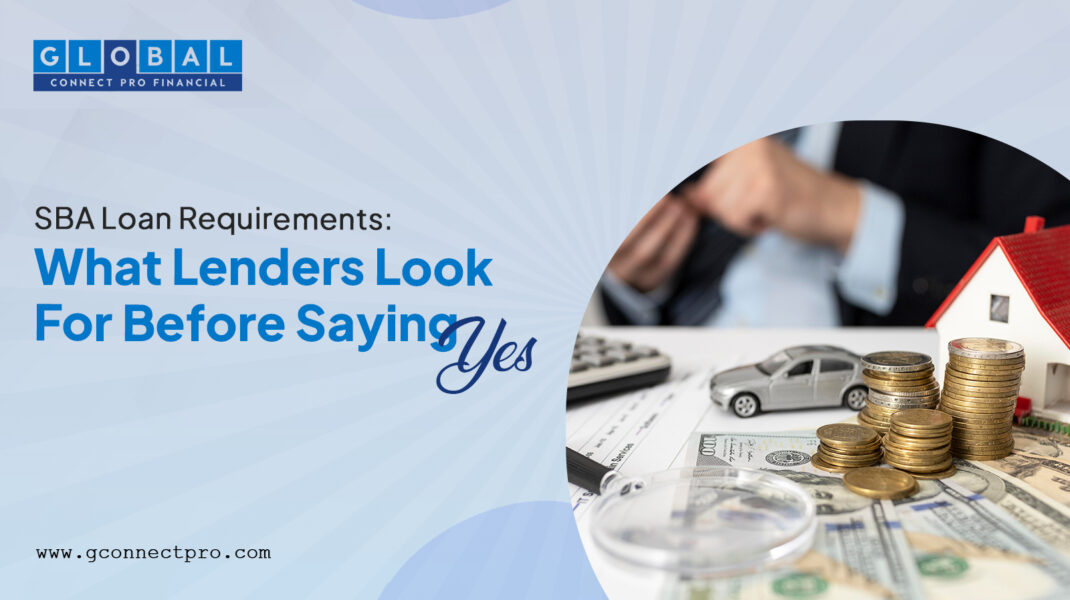SBA Loan Requirements: What Lenders Look For Before Saying Yes

Thinking about applying for an SBA loan? You’re not alone. Thousands of small business owners turn to SBA loans every year because they offer lower interest rates, longer repayment terms, and easier qualification than traditional bank loans. But to get approved, you need to know exactly what lenders are looking for—because it’s not just about asking for money.
In this guide, we’ll walk you through the most important SBA loan requirements so you can apply with confidence—and get a “yes” faster.
What is an SBA Loan?
An SBA loan is a small business loan backed by the U.S. Small Business Administration. The SBA doesn’t lend money directly. Instead, it guarantees a portion of the loan, which makes lenders more willing to approve applications. The result? Lower risk for the lender, better terms for you.
But backing alone isn’t enough. The lender still needs to make sure you meet certain requirements.
Top SBA Loan Requirements You Must Know
1. A Good Personal Credit Score
Before looking at your business, lenders look at you. A credit score of 650 or higher is ideal. It tells them you’ve handled money responsibly in the past. If your credit is lower, it’s not a deal-breaker—but you’ll need to show extra strengths elsewhere.
2. A Business That’s Up and Running (Usually 2+ Years)
Most SBA lenders prefer businesses that have been operating for at least two years. If you’re a startup, you may still qualify under certain SBA programs, but you’ll need a rock-solid business plan and possibly past experience in the same field.
3. Steady Revenue and Strong Cash Flow
Can you afford to repay the loan? Lenders will review your tax returns, profit & loss statements, and bank records. Even if you’re not making huge profits, consistent income and healthy cash flow matter more.
4. A Clear Business Plan
Your business plan doesn’t need to be complicated, but it should be clear. Lenders want to see:
- What your business does
- Who your customers are
- How you plan to grow
- How you’ll use the SBA loan
- How you’ll repay it
Think of it like a roadmap—it shows the lender where you’re going and how you’ll get there.
5. Collateral or Personal Guarantee (Sometimes Required)
Depending on the loan amount and type, you may be asked for collateral—like business assets, equipment, or property. Many lenders also require a personal guarantee, meaning you’re personally responsible if the business can’t repay the loan.
6. Business Must Be Eligible Under SBA Guidelines
Not every business qualifies. You must:
- Be a for-profit business
- Operate legally in the U.S.
- Be in an eligible industry (no gambling, illegal activity, etc.)
- Use the loan for approved purposes (like equipment, working capital, or real estate)
7. Owner Investment and Skin in the Game
Lenders want to see that you’ve already invested in your business. This shows commitment. Typically, you need to have put in 10–20% of your own money before applying for additional funding.
Final Thoughts: How to Get Approved for an SBA Loan
An SBA loan is one of the most affordable and flexible ways to finance your business. But approval isn’t just about applying—it’s about preparing. Take time to:
- Check your credit score
- Gather your financials
- Create a strong business plan
- Be ready to explain how you’ll use the loan and pay it back
The more prepared you are, the better your chances of hearing “yes.”
Ready to Take the Next Step?
If you meet the above SBA loan requirements, you’re already ahead of many applicants. Talk to an SBA-approved lender or work with a loan advisor to get started. With the right preparation, that funding you need might be just around the corner.

